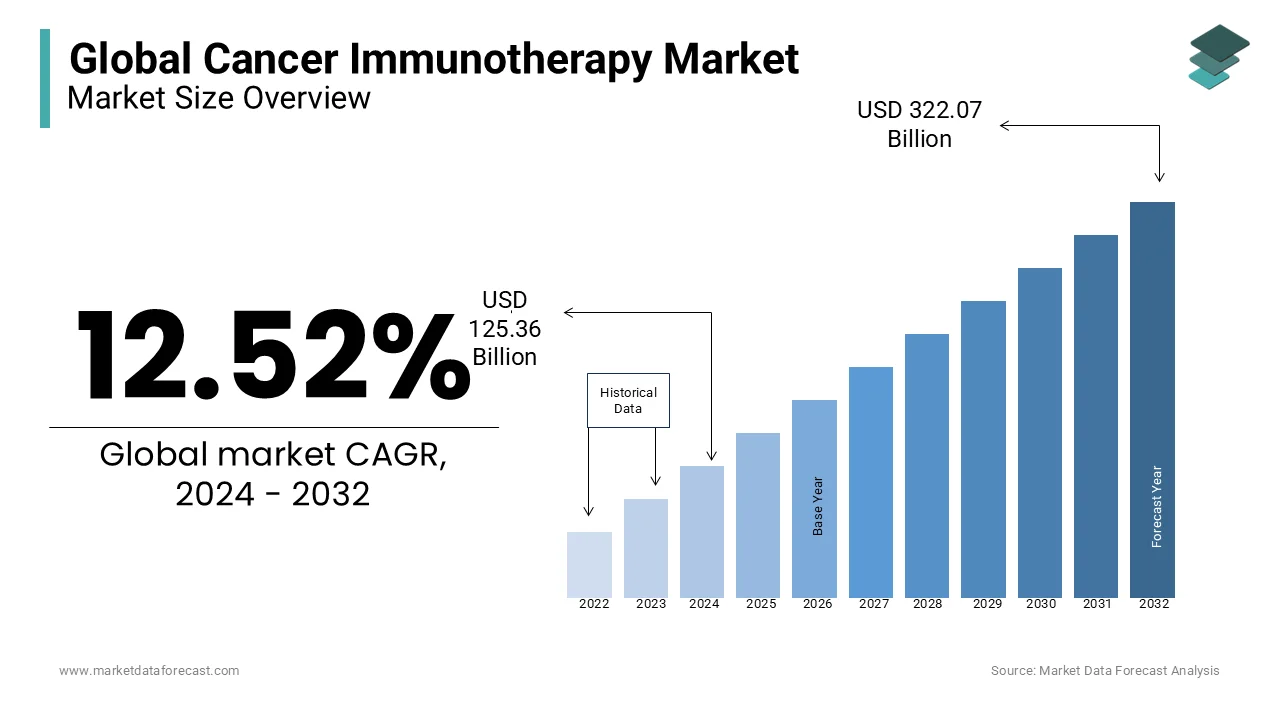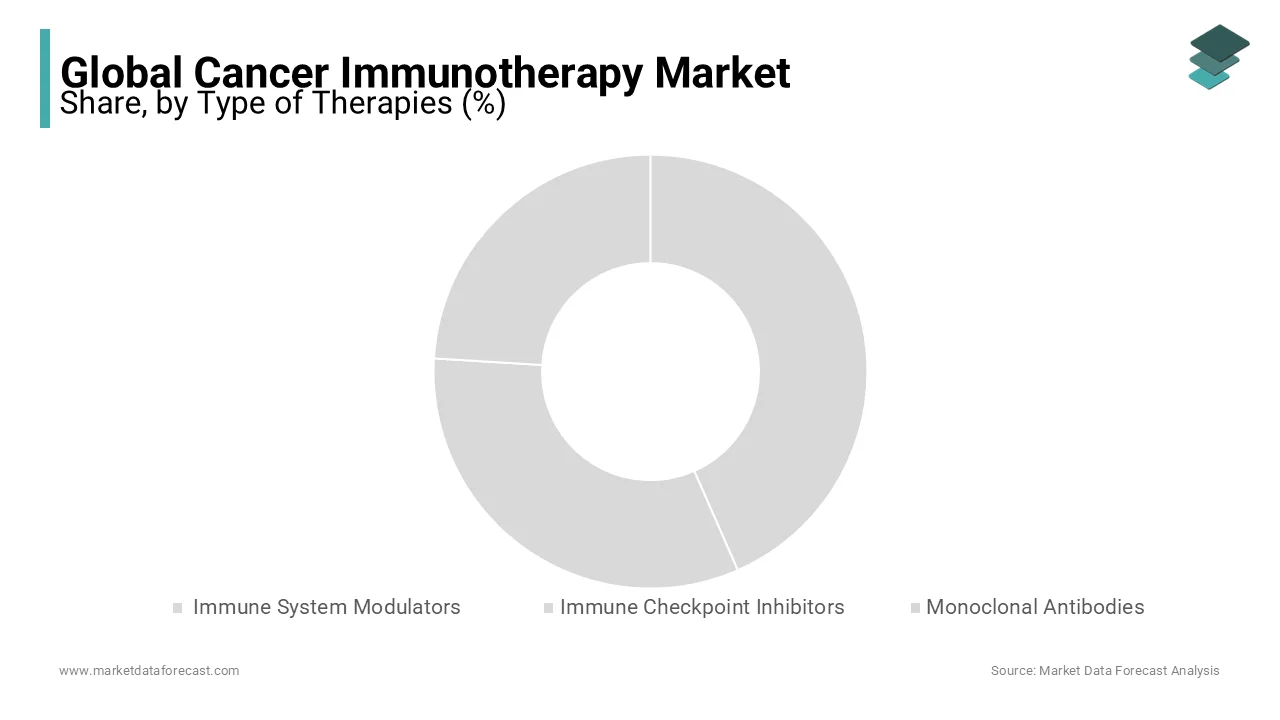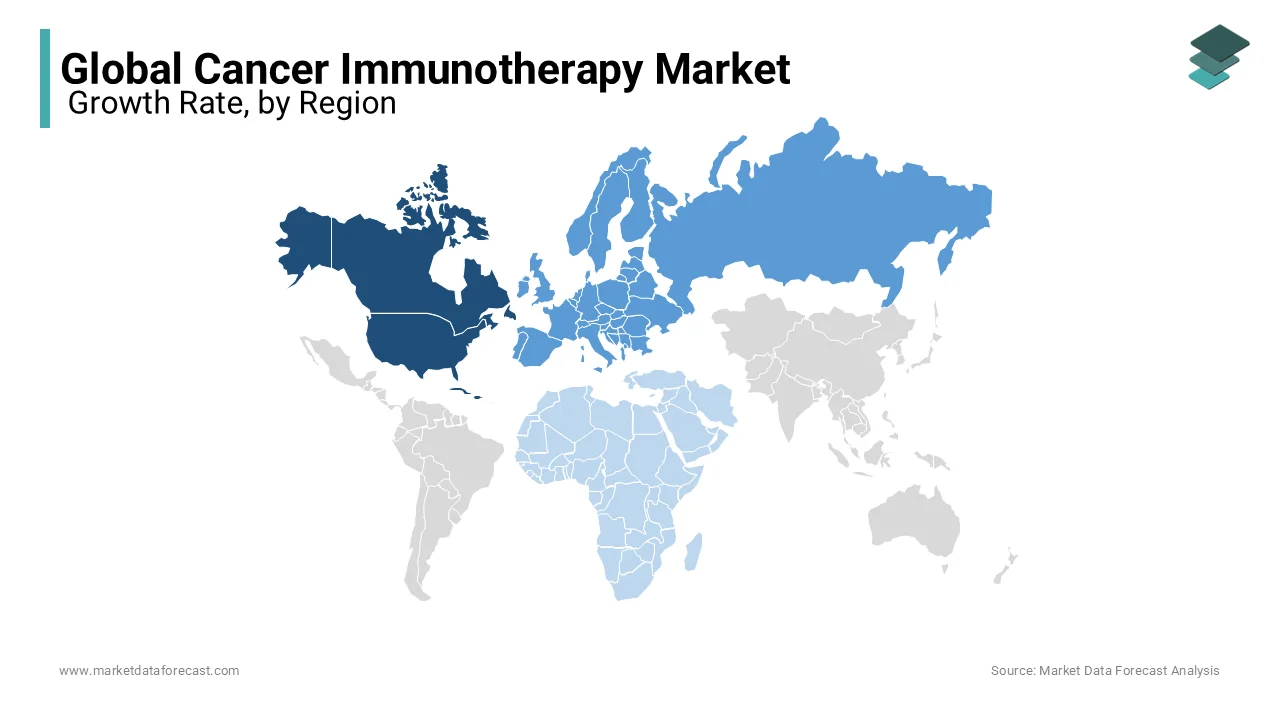Global Cancer Immunotherapy Market Size, Share, Trends, Growth Analysis Report By Type of Therapies (Immune System Modulators, Immune Checkpoint Inhibitors and Monoclonal Antibodies), Area of Therapy (Blood Cancer, Prostate Cancer, Melanoma, Breast Cancer, Lung Cancer, Colorectal Cancer & Other Minor Areas) and Region (North America, Europe, APAC, Latin America, Middle East And Africa), Industry Analysis From 2025 to 2033
Global Cancer Immunotherapy Market Size
The global cancer immunotherapy market size was valued at USD 125.36 billion in 2024 and is expected to reach USD 362.44 billion by 2033 from USD 141.06 billion in 2025, growing at a CAGR of 12.52 % during the forecast period.

MARKET DRIVERS
Rising Prevalence of Cancer
The growing prevalence of cancer, increasing number of R&D activities and technological developments in treatment options are majorly fuelling the global cancer immunotherapy market. Cancer has now become one of the leading causes of death worldwide. According to the statistics published by the World Health Organization (WHO), an estimated 9.6 million died of cancer in 2018 and found tobacco was the leading risk factor for cancer and recorded 22% of the responsibility for cancer deaths in 2018. The noticed increasing prevalence of cancer is estimated to favor the growth of the global cancer immunotherapy market.
Additionally, global cancer immunotherapy is fuelled by the high efficacy of immunotherapy compared to other treatments, fewer side effects associated with cancer immunotherapy, and reduced chance of cancer recurrence. Other notable drivers expanding the market size are technological advances in clinical therapies, increased R&D for cancer treatment, and the specificity and efficacy of cancer immunotherapy to treat a wide range of cancers. The rising adoption of advanced therapeutics for cancer and growing implementation in the healthcare sector to treat cancer diseases also support the growth of the global cancer immunotherapy market. Also, public organizations are focusing on investment in Research and development activities to develop new cancer immunotherapy. CAR–T cell therapy development is also propelling the market growth.
MARKET RESTRAINTS
High Costs
High costs associated with immunotherapy drugs are difficult for some cancer patients to afford, which is limiting the adoption and hampering the market growth. The side effects of cancer immunotherapy, such as inflammation, fatigue, and skin reactions, are another notable attribute that hinders market growth. The stringent regulatory environment for immunotherapy drugs and limited access to cancer immunotherapy in low-income countries are diluting the overall growth rate of the market. The presence of alternative cancer treatments such as chemotherapy, radiation therapy, and targeted therapy is limiting the adoption of cancer immunotherapy and affecting the market’s growth rate. Lack of awareness among patients and healthcare providers in some countries as it is a new treatment approach is further impeding the market growth.
REPORT COVERAGE
|
REPORT METRIC |
DETAILS |
|
Market Size Available |
2024 to 2033 |
|
Base Year |
2024 |
|
Forecast Period |
2025 to 2033 |
|
Segments Covered |
By Type of Therapy, Area of therapy, and Region |
|
Various Analyses Covered |
Global, Regional, & Country Level Analysis, Segment-Level Analysis, Drivers, Restraints, Opportunities, Challenges, PESTLE Analysis, Porter’s Five Forces Analysis, Competitive Landscape, Analyst Overview on Investment Opportunities |
|
Regions Covered |
North America, Europe, Asia Pacific, Latin America, Middle East, and Africa |
|
Market Leader Profiled |
F. Hoffmann-La Roche Ltd, Amgen, Viralytics, Novartis Pharmaceuticals Corporation, Pfizer |
SEGMENTAL ANALYSIS
By Type of Therapies Insights
The monoclonal antibodies segment held the major share of the global cancer immunotherapy market in 2024 and is expected to continue dominating the market during the forecast period. Monoclonal antibodies are highly effective in treating cancer. The growing usage of monoclonal antibodies in the treatment procedures of various cancers such as breast cancer, lymphoma, lung cancer, brain cancer, cervical cancer, and others is majorly boosting segmental growth. Monoclonal antibodies have fewer side effects compared to traditional cancer treatments such as chemotherapy and radiation therapy, which is another key factor contributing to the growth rate of the segment. The rising accessibility of monoclonal antibodies to the patient population is further fuelling segmental growth.

The immune system modulators segment is projected to hold a notable share of the worldwide market during the forecast period. The adoption of immune system modulators in cancer treatment procedures has risen in recent years due to their high effectiveness and high specificity. The growing R&D activities around immune system modulators to develop new and advanced therapies are further promoting the growth of the segment.
The immune checkpoint inhibitors segment is estimated to occupy a considerable share of the global market during the forecast period.
By Area of Therapy Insights
The lung cancer segment is predicted to hold the major share of the global cancer immunotherapy market during the forecast period. The growing lung cancer patient population is majorly boosting segmental growth. Immunotherapy has shown promising results in treating lung cancer, and due to this, the adoption of cancer immunotherapies in lung cancer treatment procedures has grown consistently over the last few years. The growing number of investments in conducting R&D to develop new and effective lung cancer immunotherapies is further promoting the growth rate of the segment.
The breast cancer segment is another notable segment and is expected to hold a substantial share of the global cancer immunotherapy market during the forecast period. The growing prevalence of breast cancer and the increasing need for effective cancer immunotherapies are majorly driving the growth of the segment.
REGIONAL ANALYSIS
North America held the largest share of the global cancer immunotherapy market in 2024 and the region’s dominance is predicted to continue during the forecast period. The cancer patient population is growing significantly in North American countries, which is one of the key factors propelling the North American market growth. In addition, increasing accessibility to advanced cancer immunotherapies to the patient population, the presence of notable market participants, and increasing investments in cancer immunotherapies by governmental and non-governmental organizations are promoting market growth in North America. The growing aging population in the North American region is another notable factor contributing to the regional market growth. The growing number of pharmaceutical and biotechnological companies in the North American market is further favoring regional market growth. The U.S. cancer immunotherapy market, followed by Canada, accounted for the largest share of the North American market in 2024 and the same trend is estimated to continue throughout the forecast period. The growing demand for precision medicine and the increasing number of product launches drive the U.S. market growth.

Europe had a substantial share of the global market in 2024 and is predicted to witness a noteworthy CAGR during the forecast period. Factors such as the presence of a sophisticated healthcare system in the European region, the increasing cancer patient population in Europe, and the growing demand for cancer therapies are propelling the European market growth. The growing adoption of technological developments and an increasing number of clinical trials for the development of new cancer immunotherapies are fuelling regional market growth. Germany, Switzerland, and the UK held the leading share of the European market in 2024.
Asia-Pacific is predicted to showcase the fastest CAGR among all the regions globally during the forecast period. The growing investments by governmental and non-governmental organizations for the development of cancer immunotherapies and rising emphasis on companion diagnostics and precision medicine are supporting the cancer immunotherapy market in the Asia-Pacific region. Japan, China, and South Korea accounted for a major share of the APAC market in 2024.
The Latin American cancer immunotherapy market captured a considerable share of the global market in 2024 and is expected to grow steadily during the forecast period. Mexico and Brazil are promising regional markets for cancer immunotherapy in Latin America.
The MEA market is estimated to hold a moderate share of the global market during the forecast period. The United Arab Emirates and South Africa are expected to occupy a major share of the MEA market in the coming years owing to the growing healthcare infrastructure and increasing awareness among healthcare providers regarding the available treatment options for cancer.
KEY MARKET PLAYERS
Companies leading the global cancer immunotherapy market profiled in the report are F. Hoffmann-La Roche Ltd, Amgen, Viralytics, Novartis Pharmaceuticals Corporation, Pfizer, GlaxoSmithKline Pharmaceuticals Limited, AstraZeneca plc, Medivation, Advaxis, Bristol-Myers Squibb, Merck & Co, Celgene Corp, and Immunomedics.
RECENT HAPPENINGS IN THIS MARKET
- In 2019, Roche Holding AG approved launching its new atezolizumab cancer immunotherapy in India. It is beneficial to treat small cell lung cancer patients with chemotherapy. Also, the company wants to expand its developed market in India to treat cancer disorders.
- In 2019, Merck introduced a new cancer immunotherapy, Keytruda, with Pfizer Inlyta to minimize kidney cancer disease risk. The drug will give a high response rate and improved progression compared to chemotherapy treatment.
- In March 2020, Forty-seven was acquired by Gilead Life Sciences. This acquisition has helped Gilead expand its global cancer immunotherapy treatment for various diseases. Forty-seven has the lead product magnolia, which is a monoclonal antibody used for the treatment of acute myeloid leukemia and B-cell lymphoma.
- In October 2015, the FDA approved the first oncolytic virus therapy known as Talimogene laherparepvec (T-VEC or Imlygic). The vaccine treats metastatic melanoma that cannot be eliminated by surgery.
MARKET SEGMENTATION
This market research report on the global cancer immunotherapy market has been segmented and sub-segmented based on the type of therapies, treatment area, and region.
By Type of Therapies
- Immune System Modulators
- Immune Checkpoint Inhibitors
- Monoclonal Antibodies
By Area of Therapy
- Blood Cancer
- Prostate Cancer
- Melanoma
- Breast Cancer
- Lung Cancer
- Colorectal Cancer
- Other Minor Areas
By Region
- North America
- Europe
- Asia Pacific
- Latin America
- The Middle East and Africa
Frequently Asked Questions
Which region is growing the fastest in the global cancer immunotherapy market?
Geographically, the North American cancer immunotherapy market accounted for the largest share of the global market in 2024.
How much is the global cancer immunotherapy market going to be worth by 2033?
As per our research report, the global cancer immunotherapy market size is projected to be USD 362.44 billion by 2033.
Which are the significant players operating in the cancer immunotherapy market?
Amgen, Viralytics, Novartis Pharmaceuticals Corporation, Pfizer, GlaxoSmithKline Pharmaceuticals Limited, AstraZeneca plc, Medivation, Advaxis, and Bristol-Myers Squibb are some of the significant players operating in the cancer immunotherapy market
At What CAGR, the global cancer immunotherapy market is expected to grow from 2025 to 2033?
The global cancer immunotherapy market is estimated to grow at a CAGR of 12.52 % from 2025 to 2033.
Related Reports
Access the study in MULTIPLE FORMATS
Purchase options starting from
$ 2500
Didn’t find what you’re looking for?
TALK TO OUR ANALYST TEAM
Need something within your budget?
NO WORRIES! WE GOT YOU COVERED!
Call us on: +1 888 702 9696 (U.S Toll Free)
Write to us: sales@marketdataforecast.com
